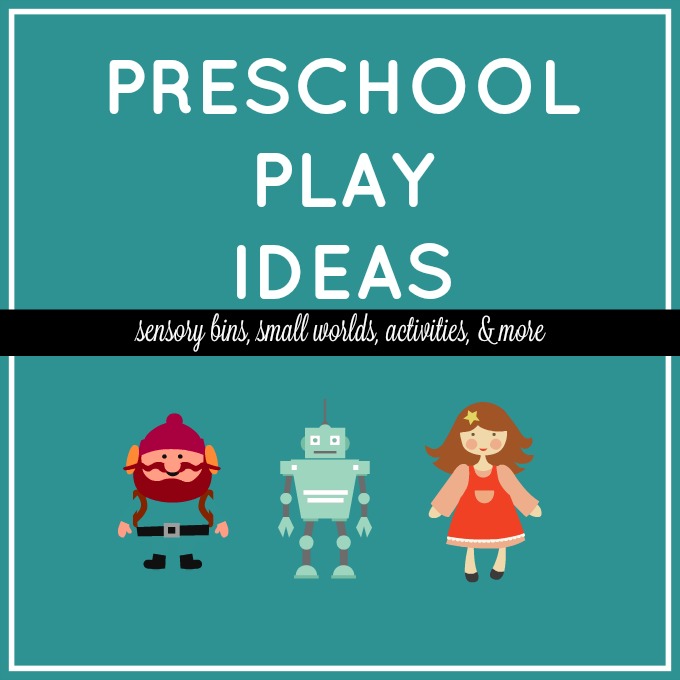Play is an elusive concept, and it’s an essential part of life, not just childhood. Educators and psychologists alike describe play as a means for organizing information and learning. Through all various types of play, pretend or dramatic, free or guided play, learning is constantly happening.

Preschool Play Activities
Research on Benefits of Play
Games
Invitations to Play
Pretend or Dramatic Play
Sensory Play
Small World Play
What is Play?
Play is the act of engaging in something for pure enjoyment, but play is much more complex than that. Play consists of five distinct characteristics as noted by Dr. Kathy Hirsh-Pasek and Dr. Roberta Michnick Golinkoff in their book Einstein Never Used Flashcards. They are as follows: play…
- is pleasurable and enjoyable
- has no extrinsic goals
- is spontaneous and voluntary
- requires active movement
- is imaginative
What is Play in Education?
There are two primary approaches to play in education and both have benefits to the purpose to the learning environment.
The two types of play are free play and guided play. (They are sometimes referred to as structured and unstructured play.) The value of each lies in their purpose.
Free play allows children to create their own rules and settings. It is completely open-ended.
Guided play refers to staged activities for children to explore with a specific purpose. It has specific rules and objectives.
It is easy to think that guided play holds more value in preschool, however for children to develop healthfully they also need free play just as much.
What is Free Play?
Free play is led by children. They pick what to do and how to do it, allowing them to express themselves freely and interact with their surroundings without limits. Children start, maintain, and expand their play without adult interference.
However, this usually involves things they already know. Some experts debate how free ‘free play’ really is, as the kids’ choices can be influenced by the rules and boundaries of the play area (set by adults), and what others choose to play.
What is Guided Play?
Guided play is a learning approach where kids lead the play with their own interests, while adults mentor them to achieve specific learning goals.
It’s a blend of free play—which is fun, chosen by the child, and adaptable—with a focus on educational results under adult supervision. This method allows children to flourish as they actively participate and enjoy their playtime.
Why Guided Play in Early Childhood?
To achieve particular learning objectives, some guidance from adults is crucial.
Therefore, guided play incorporates two main components: independence for the child and direction from an adult. This approach keeps playtime engaging for the child while simultaneously directing their attention towards aspects that are relevant to a specific learning goal.
Guided Play Examples
In guided play, the educator deliberately designs the learning environment with particular educational objectives in mind. Here are some examples of what guided play might look like in the preschool classroom.
- Playdough invitations to play
- Small world play
- Using snap cubes to build number sets
- Engaging with foam or wooden geometric figures
- Outdoor exploration walks
- Basic puzzle solving
- Exercises integrating music and physical movement
- Pretend play
- Sensory play
Importance of Play
Play encourages all areas of proper development, from cognitive and physical to social and emotional. Here are some facts about the benefits of play:
- Play builds self-esteem and confidence.
- Play develops problem-solving skills.
- Play encourages new vocabulary usage.
- Play teaches children to collaborate.
- Play teaches children to be alone and independent.
- Play allows children to release their emotions.
- Play encourages planning and thinking ahead.
When you think of play, you think of a happy, carefree environment. But there’s much more going on than just fun. Children are actively learning and developing through their play.
